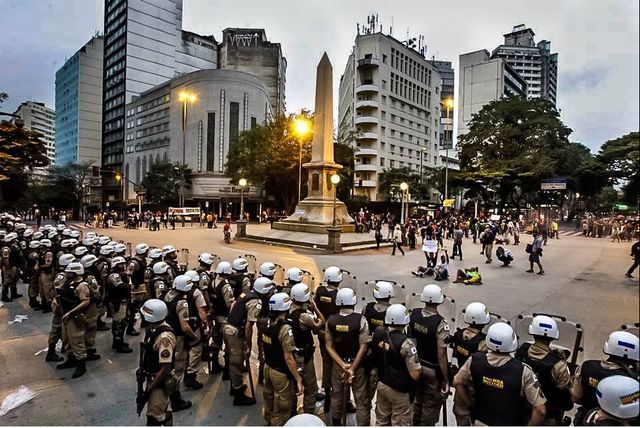On Opening Day of the World Cup, Protests continue in Brazil

Hours before the opening ceremony of the football-soccer World Cup in Sao Paulo Thursday, protests continued across Brazil. Sao Paulo, the center of the opening festivities, is a city occupied by military forces. In the morning hours, the police used tear gas and rubber bullets to contain a protest march.
At least five people, three reporters and two protesters, were reported injured. Police surrounded the demonstrators as they were nearing the Itaquerao stadium and forced them to retreat. Subway workers staged another demonstration, demanding that the state governor rehire scores of transit workers victimized during last week’s strike in this city, the largest in Latin America.
 Police and protesters at the city center [Photo: Midia NINJA]
Police and protesters at the city center [Photo: Midia NINJA]
Demonstrations continued throughout the day, as protesters threw stones at the police and attempted to disable transit signals in the vicinity of the stadium.
In Río de Janeiro, striking airport workers blocked routes in and out of the city’s airports, teachers marched through the city center, demanding better working conditions, and 1,000 demonstrators chanting “FIFA go home” marched without incidents. Police blocked roads leading into Copacabana beach, one of the city’s main tourist centers.
In the northeastern city of Natal, bus drivers declared themselves on strike. Smaller marches took place in the other World Cup host cities.
The street protests and strikes are a continuing reflection of popular anger over the US$11.3 billion spent on the World Cup—four times the initial estimate—at a time in which clinics, schools, mass transit and other social services are facing cutbacks.
The Sao Paulo transit union bureaucracy called off a five-day walkout on Monday under pressure not to interfere with the World Cup ceremony. Forty-two workers were sacked, accused by the Metropolitan Company of Sao Paulo ( Companhia do Metropolitano do Sao Paulo ) of participating in violent incidents (i.e., defending the strike against police-assisted strike-breaking). A subsequent attempt by the company to review the sackings was blocked by Sao Paulo state governor Geraldo Alckim.
The strike cancellation took place following an unprecedented Labor Court hearing on a Sunday that declared the strike “abusive” and threatened the union with massive fines. The workers went back to work with none of the issues settled, namely a 12 percent wage demand and the rehiring of the fired workers, with the assurance by the union that the struggle would resume on Wednesday, a day before the opening of the World Cup, if the workers were not reinstated.
The Union of Metro Workers ( Sindicato do Operadores do Metro, SOM) leadership headed by Altino Prazeres, a follower of the pseudo-left PSTU ( Partido Socialista dos Trabalhadores Unificado, a branch of the Morenoite tendency in Brazil) decided on Tuesday not to renew the strike on Wednesday, as originally promised, if all the sacked workers were not rehired. (As of this week, only three had been rehired.)
Despite previous militant rhetoric, in the end the pseudo-lefts caved in to the intransigence of the courts and Governor Alckmin, isolating the metro workers and limiting their response to a protest action on Thursday. The leadership declined to resume the strike or to mobilize support from broader sections of Brazilian workers in a political struggle, despite evidence of widespread support for the transit workers in Sao Paulo. In this the Sao Paulo pseudo-left metro union leadership proved no different from the conservative trade union bureaucracies that betray and isolate workers struggles everywhere.
The football World Cup, which was expected to show a new, more prosperous Brazil to the rest of the world and unify the population in a celebration of national pride, is presenting an opposite image, that of a nation bitterly divided by inequality and economic stagnation.
Nearly every stadium and infrastructure project came in over budget, draining government resources, while a tiny minority enriched itself, in part due to widespread corruption.
The Brasilia stadium serves as an example. The Mexico City daily El Universal reported in May that the stadium cost three times what was budgeted due to fraudulent billing. The high-tech stadium is named after famous soccer player Mané Garrincha, perhaps the most beloved football player of all time, who died in abject poverty in 1983.
The El Universal article provides evidence, gathered by the Associated Press, of a “stratospheric” increase in political contributions by those companies that won contract bids for World Cup projects. “The general contractor for the Brasilia stadium increased political donations in the latest elections by a factor of 500,” according to the May 12 article. It added that “rage over perceived corruption contributed to last year’s mass demonstrations and there are fears that this may ruin the World Cup.”
In addition to the fraudulent billing, El Universal suggests that steel bought for this project was diverted elsewhere.
Despite increasing evidence of payoffs, no one has been prosecuted.
The opening game in Sao Paulo, between the Brazilian national team and its Croatian counterpart, took place without incident. The Brazilian team—perhaps affected by the protests outside— disappointed many of its fans. It won by just 3 to 1, helped by a controversial penalty call against the Croatian team.

